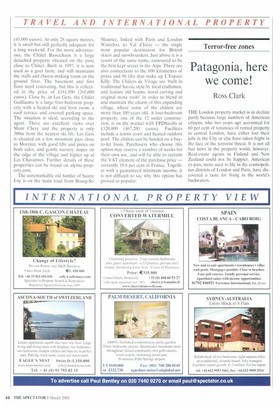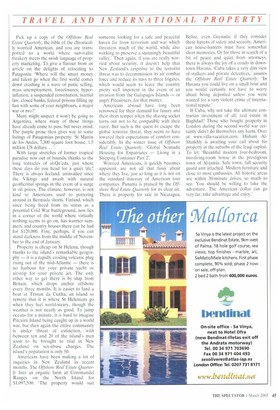Terror-free zones
Patagonia, here we come!
Ross Clark
THE London property market is in decline partly because large numbers of American citizens, who two years ago accounted for 60 per cent of tenancies of rented property in central London, have either lost their jobs in the City or else have taken fright in the face of the terrorist threat. It is not all bad news in the property world, however. Real-estate agents in Finland and New Zealand could not be happier. American ex-pats, more used to life in the cosmopolitan districts of London and Paris, have discovered a taste for living in the world's backwaters. Pick up a copy of the Offshore Real Estate Quarterly, the bible of the chronically worried American, and you are transported to a world where survivalist freakery meets the swish language of property marketing. To give a flavour from an article on the delights of relocating to Patagonia: 'Where will the smart money and talent go when the first world comes down crashing in a wave of panic selling, mass unemployment, foreclosures, hyperinflation, a suspended constitution, martial law, closed banks, federal prisons filling up fast with some of your neighbours, a major war or two?'
Many might suspect it won't be going to Argentina, where many of those things have already come to pass, but never mind. The purple prose then gives way to some listings of Patagonian property: 'St Martin de los Andes, 7,300 square foot house, 1.5 million US dollars... '.
With large stretches of former tropical paradise now out of bounds, thanks to the long tentacles of al-Qa'eda, just where these days do you head for a quiet life? There is always Iceland, uninvaded since the Vikings and awash with natural geothermal springs in the event of a surge in oil prices. The climate, however, is not kind to Americans used to pottering around in Bermuda shorts. Finland, which since being freed from its status as a potential Cold War battleground, now lies in a corner of the world where virtually nothing seems to go on, has warmer summers, and country houses there can be had for $120,000. Fine, perhaps, if you can stand darkness from the middle of November to the end of January.
Property is cheap on St Helena, though thanks to the island's remarkable geography — it is a rapidly eroding volcanic plug rising out of the mid-Atlantic — there is no harbour for your private yacht or airstrip for your private jet. The only other way to get there is by ship from Britain, which drops anchor offshore every three months. It is easier to land a boat at Tristan da Cunha, an island so remote that it is where St Helenians go when they feel world-weary, though the weather is not nearly as good. To jump oceans for a minute, it is hard to imagine Pitcairn Island being caught up in a world war, but then again the entire community is under threat of extinction, with between ten and 20 of the island's men soon to be brought to trial in New Zealand on sex-abuse charges. The island's population is only 50.
Americans have been making a lot of inquiries in New Zealand in recent months. The Offshore Real Estate Quarterly lists an organic farm at Coromandel Ranges on the North Island for S1,097,500: 'The property would suit
someone looking for a safe and peaceful haven far from terrorism and war which threatens much of the world, while also working to preserve a stunningly beautiful valley: Then again if you are really worried about security, it doesn't help that New Zealand's response to the terrorist threat was to decommission its air combat force and reduce its navy to three frigates, which would seem to leave the country pretty well impotent in the event of an invasion from the Galapagos Islands — or angry Pitcairners, for that matter.
Americans abroad have long been renowned for their demand for luxury and their short temper when the shaving socket turns out not to be compatible with their razor. But such is the quest to escape the global terrorist threat, they seem to have lowered their expectations of comfort considerably. In the winter issue of Offshore Real Estate Quarterly: 'Global Nomadic Housing for Expatriates — Living in a Shipping Container Part 2'.
Worried Americans, it quickly becomes apparent, are not all that fussy about where they live, just so long as it is not on the standard itinerary of American tour companies. Panama is praised by the Offshore Real Estate Quarterly for its clear air. There is property for sale in Nicaragua.
Belize, even Grenada; if they consider these havens of safety and security, American house-hunters must have somewhat short memories. Or for those in search of a bit of peace and quiet from attorneys, there is always the joy of a condo in downtown Havana. 'Cuba takes a very dim view of stalkers and private detectives,' assures the Offshore Real Estate Quarterly. 'In Havana you could live on a small boat and you would certainly not have to worry about being deported unless you were wanted for a very violent crime of international repute.'
If Cuba, why not take the ultimate contrarian investment of all: real estate in Baghdad? Those who bought property in London during the second world war certainly didn't do themselves any harm. Over at www.villa-vacation,com, Hisham AlShaikhly is awaiting your call about his property in the suburbs of the Iraqi capital. To let: 'Beautiful modern four-bedroom, two-living-room house in the prestigious town of Al-jamia. Safe town, full security guard unit attachedModern furniture and close to most embassies. All historic areas are within 30-minute drives, so much to see. You should be willing to take the adventure. The American dollar can go very far, take advantage and enjoy.'



















































































 Previous page
Previous page